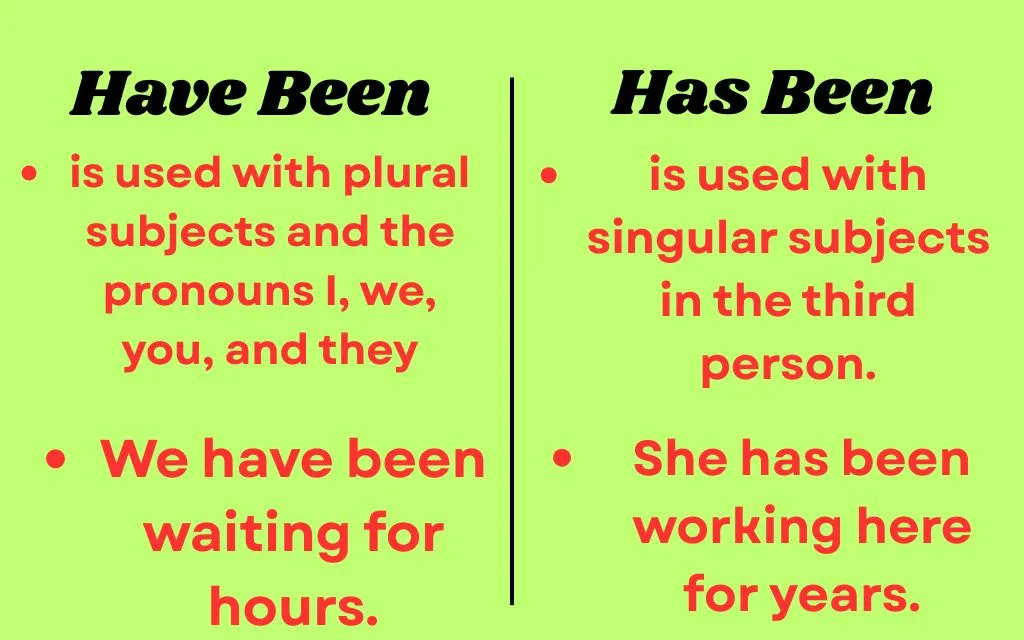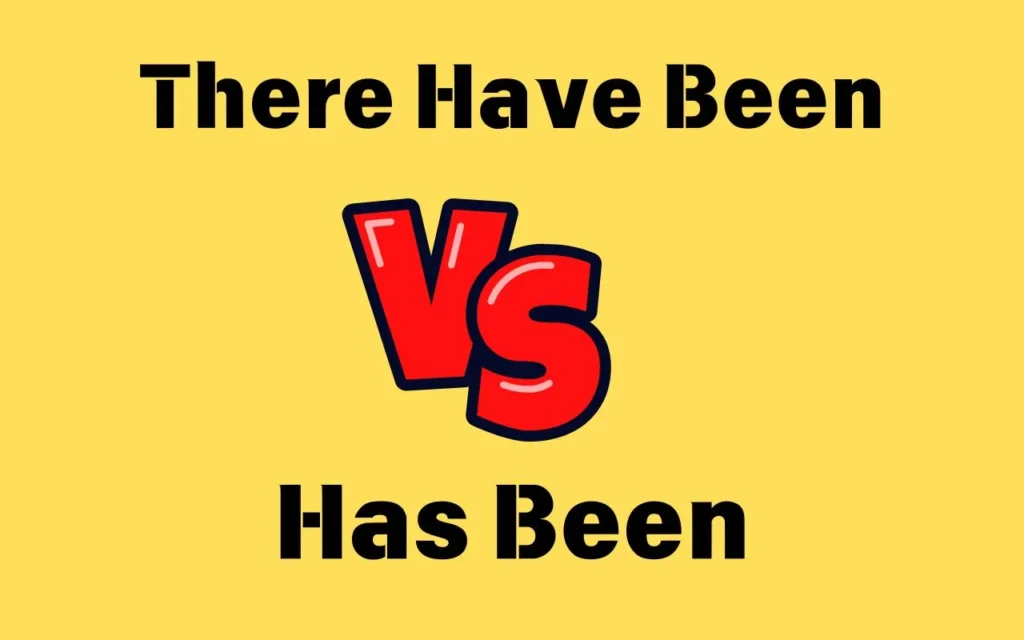Last updated on April 17th, 2025 at 07:22 am
English grammar often feels like a maze, especially when it comes to figuring out which verb form to use in different contexts.
One such puzzle involves the phrases “there have been” and “there has been.” Both are correct, but their usage depends entirely on the subject and its agreement with the verb.
In this comprehensive guide, we’ll break down the rules, provide practical examples, and help you master when to use each phrase confidently.
Understanding the Basics of ‘Has Been’ and ‘Have Been’

To understand when to use has been and have been, it’s essential to revisit their grammatical foundations.
Both are part of the present perfect tense, which is used to describe actions or situations that began in the past and continue to the present, or whose effects are still relevant.
Confused between “there have been” and “there has been”? Learn the difference, grammar rules, and examples to confidently use them in any context.
- ‘Has Been’ is used with singular subjects in the third person.
Example: “She has been working here for years.” - ‘Have Been’ is used with plural subjects and the pronouns I, we, you, and they.
Example: “We have been waiting for hours.”
The distinction boils down to subject-verb agreement, which is one of the core principles of English grammar.
The Present Perfect Tense: ‘Has Been’ vs. ‘Have Been’
The present perfect tense combines the auxiliary verbs has or have with the past participle of the main verb.
Why Use the Present Perfect Tense?
- To indicate actions that began in the past but are still ongoing.
Example: “It has been raining all day.” - To show the result of a past action that affects the present.
Example: “There have been changes to the schedule.”
Key Difference
- Use has been with singular subjects: He, she, it, or singular nouns.
- Use have been with plural subjects: I, we, you, they, or plural nouns.
When to Use ‘Has Been’ with Third Person Singular Subjects
Has been specifically applies to singular third-person subjects, which include pronouns like he, she, it, and singular nouns.
Examples:
- “She has been the CEO since 2020.”
- “It has been a long journey.”
- “The dog has been barking all night.”
Tip:
When in doubt, check the subject of the sentence. If it’s singular and in the third person, has been is the correct choice.
Applying ‘Have Been’ with Plural and First Person Subjects
On the other hand, have been aligns with plural subjects and the first and second person pronouns I, we, you, they.
Examples:
- “I have been learning French for two years.”
- “We have been friends since childhood.”
- “They have been busy with their new project.”
This rule applies regardless of whether the sentence describes an action or a state of being.
The Role of ‘Had Been’ in Perfect Tenses
While has been and have been are present perfect, had been takes us into the past perfect tense.
When to Use ‘Had Been’
- To describe an action or state that was completed before another past action.
Example: “She had been studying for hours before the exam started.”
Comparison:
| Tense | Usage Example |
|---|---|
| Present Perfect | “She has been working here since 2015.” |
| Past Perfect | “She had been working here before the merger.” |
Distinguishing Between Past and Present Perfect Uses
A common source of confusion is when to use present perfect versus past perfect. The key lies in the timeframe:
- Present Perfect: Refers to ongoing relevance or a connection to the present.
Example: “There have been many advances in technology recently.” - Past Perfect: Refers to something completed entirely in the past.
Example: “There had been no electricity during the storm.”
Complexities of Subject-Verb Agreement in English
Subject-verb agreement plays a crucial role in choosing between has been and have been. This is where English learners often stumble, especially with tricky subjects like compound phrases or collective nouns.
Navigating Compound Subjects and Prepositional Phrases
Compound Subjects
If two singular nouns are joined by and, the subject becomes plural, requiring have been.
- “John and Sarah have been traveling together.”
Prepositional Phrases
Sometimes, prepositional phrases between the subject and verb cause confusion. Ignore them to identify the true subject.
- Incorrect: “The group of students have been practicing.”
- Correct: “The group of students has been practicing.”
Identifying the Real Subject in Complex Sentences
In complex sentences, the subject isn’t always straightforward.
Example:
- “There has been a series of unfortunate events.”
Here, the real subject is a series (singular), so we use has been.
Expanding the Verb Phrase: Adverbs with ‘Has Been’ and ‘Have Been’
Adverbs are often used to modify has been or have been, adding nuance or emphasis.
Examples:
- “He has been consistently meeting his goals.”
- “They have been always supportive of our efforts.”
Adverbs should be placed either before the main verb or at the end of the sentence for clarity.
Practical Examples: Using ‘Has Been’, ‘Have Been’, and ‘Had Been’ in Sentences
Present Perfect:
- “There has been a lot of debate about climate change.”
- “There have been several proposals for the new project.”
Past Perfect:
- “There had been no announcements before the sudden decision.”
Table for Quick Reference:
| Subject | Correct Phrase | Example |
|---|---|---|
| He, she, it, singular | Has been | “He has been waiting for hours.” |
| I, we, you, they, plural | Have been | “They have been preparing for the event.” |
| All subjects (past) | Had been | “She had been hoping for a promotion.” |
Common Mistakes and Tips for Mastery
Mistake 1: Misusing has been with plural subjects
- Incorrect: “They has been working hard.”
- Correct: “They have been working hard.”
Mistake 2: Ignoring the real subject in sentences with there
- Incorrect: “There has been many problems.”
- Correct: “There have been many problems.”
Tips for Mastery:
- Always identify the true subject of the sentence.
- Double-check singular vs. plural agreement.
- Practice with examples to build confidence.
FAQs
When should I use “there have been”?
Use “there have been” when the subject is plural. For example: “There have been many changes recently.”
When do I use “there has been”?
Use “there has been” when the subject is singular. For instance: “There has been a significant update.”
What is the main difference between “have been” and “has been”?
The difference lies in subject-verb agreement. “Have been” is for plural subjects or pronouns like I, we, you, and they. “Has been” is for singular third-person subjects.
Can I use “has been” with plural subjects?
No, “has been” is only correct with singular subjects like he, she, it, or singular nouns.
Why is subject-verb agreement important in English?
Subject-verb agreement ensures clarity and correctness in communication. Mistakes can confuse readers or listeners.
Conclusion
Mastering the distinction between has been and have been is all about understanding subject-verb agreement and the nuances of perfect tenses.
With this guide, you now have the tools to use these phrases correctly and confidently in any context.
Whether you’re writing a formal paper or having a casual conversation, remembering these rules will ensure your grammar is spot-on every time.





